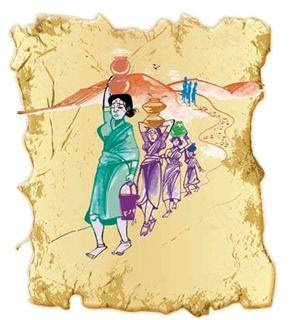Once upon a time there was king.
He had seven sons. One day the seven princes went fishing. They returned
with seven fish and put it aside to dry. All the fish dried up except one.
The princes asked the fish, ‘Fish ‘O’ fish. Why aren’t you dry?’ The fish replied, ‘The hay stack came in between.’
The princes questioned the hay stack. ‘Hay stack, hay stack, why did you come in between?’
‘The cow didn’t eat me, so I came in between the fish and the hay stack.’
The princes then went to the cow and asked, ‘Cow, cow, why didn’t you go to graze?’
‘The calf would not leave me so I didn’t go to graze the grass,’ said the cow.
‘Calf, calf, why didn’t you leave the cow?’ they asked the calf tied in the cattle shed.
The calf said, ‘The old lady didn’t give me food. So I didn’t leave the cow.’
‘Old lady, old lady, why didn’t you give food to the little one?’ they asked.
The old lady answered, ‘My son was crying so I didn’t give food to the calf.’
They asked the small boy, ‘Little one, why did you cry?’
‘An ant bit me,’ said the little boy.
Then the princes went to the ant and asked, ‘Ant…..ant….. why did you bite?’
The ant answered, ‘Will I not bite if anyone puts a finger in my anthill?’
If anyone puts a finger into the anthill, the ant will bite? Won’t it?
As kids our maternal or paternal grandparents have always told this story again and again. Yet, it felt so good to hear the same story every time. As we grew up, the story seemed to make no sense whenever we remembered it.
Looking back and pondering over the story, it became clear that there is a lesson about the environment in this.
The fish does not dry up due to a number of reasons such as obstructing hay-stack, cow not able to go grazing, the calf not allowing the cow to go etc. The story goes on and ultimately the main reason is shown as the boy putting his finger into the anthill. There are a number of intermediary stages between the boy’s finger in the anthill and fish not being dry. Each stage influences the other.
This story clearly indicates that we should understand the relationship between things. Whatever we do is in turn influenced by many things. An aspect which seems to have no relation may generate a chain reaction having long-term effects. At present the problems in the environment is somewhat similar to this. The story in a simple way explains the relation between the elements.
There are two things which affect the environment: Not doing a particular work which needs to be done and doing something which need not be done. The food chain is shaken up even if one living thing gets eliminated or gets affected. The story is an example of such situations.
Over the years, the number of varieties of birds has gone down. Scientific studies reveal that the use of chemicals used in the fields is the main cause for this. The chemical residues in pesticides that are sprayed in the field over a period of time get mixed in water. The residues enter the bodies of the small organisms present in the water.
The bigger organisms eat the smaller ones. This is in turn food for the larger organisms in the food chain. This leads to the residues getting into the bodies of the larger organisms. The birds feeding on these organisms get the residual DDT into their bodies. The reproduction of eggs also decreases. The hatching takes place early resulting
in the death of baby birds. All these result in the decrease of the number of birds. This is one of the main reasons for banning DDT in many countries. Do you find any similarity between this story and the actual happenings?
































